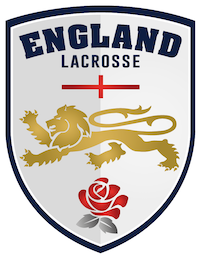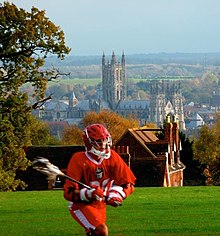
Lacrosse is a contact team sport played with a lacrosse stick and a lacrosse ball. It is the oldest organized sport in North America, with its origins with the indigenous people of North America as early as the 12th century. The game was extensively modified by European colonists, reducing the violence, to create its current collegiate and professional form.

The Southern Conference (SoCon) is a collegiate athletic conference affiliated with the National Collegiate Athletic Association (NCAA) Division I. Southern Conference football teams compete in the Football Championship Subdivision. Member institutions are located in the states of Alabama, Georgia, North Carolina, South Carolina, Tennessee, and Virginia. Established in 1921, the Southern Conference ranks as the fifth-oldest major college athletic conference in the United States, and either the third or fourth oldest in continuous operation, depending on definitions.
Football is the most popular sport in the United Kingdom. Football is organised on a separate basis in each of the four constituent countries, England, Scotland, Wales, and Northern Ireland, that make up the United Kingdom (UK), with each having a national football association responsible for the overall management of football within their respective country. There is no United Kingdom national football team. Football has been the most popular sport in the UK since the 1860s. Rugby union, rugby league and cricket are other popular sports.

Sport holds the central place in British culture, and the United Kingdom has played a key role in both the development and global spread of many sports. In the early stages of organized sport, the Home Nations were instrumental in establishing formal rules and forming some of the earliest governing bodies, national teams, and domestic league competitions.
Lacrosse in Australia is a minor sport, with a long and proud history dating back to 1876, with a small but dedicated community of participants and volunteers. The established centres for lacrosse are in the greater metropolitan areas of Melbourne, Adelaide, and Perth. In these cities there are organised weekend field lacrosse competitions for men and women at senior and junior levels, played over the winter months. In the off-season, there are informal box lacrosse and sofcrosse competitions, though the majority of players in Australia are mostly of the field lacrosse type. Some lacrosse is also played in Sydney, South East Queensland, Canberra, Ballarat and Bendigo, it is very much at the developmental level.

Sport plays a central role in Scottish culture. The temperate, oceanic climate has played a key part in the evolution of sport in Scotland, with all-weather sports like association football and golf dominating the national sporting consciousness. However, many other sports are played in the country, with popularity varying between sports and between regions.

Team Durham is a student-run organisation responsible for sport at Durham University. Durham University's sports programme, run by Team Durham, has produced more professional sports people than any other UK university and has twice seen Durham named Times and Sunday Times Sports University of the Year. It has ranked in the top three institutions in British Universities and Colleges Sport (BUCS) every season since 2011–12. Eight Team Durham alumni or current athletes have won nine Olympic and Paralympic medals since 1996.

Oxford University Handball Club (OUHaC) was founded and registered as a club at the University of Oxford in 2001 and has since established itself as one of England's most successful clubs. It is a member of the England Handball Association since 2002 and the Association of British Universities Handball Clubs since 2011. Every year, OUHaC competes in the English Handball League, EHA Cup and the British University Championships. Beginning in 2014, the club has played in the varsity match against the Cambridge University Handball Club. In 2016 and 2017 respectively, the women's and men's teams were granted Half Blue status by the Blues committees of the University of Oxford.
Sport in England plays a prominent role in English society. Popular teams sports in England include association football, cricket, field hockey, rugby union, rugby league, and netball. Major individual sports include badminton, athletics, tennis, boxing, golf, cycling, motorsport, and horseracing. Cricket is regarded as the national summer sport. Football is generally considered to be the popular sport, followed by cricket, tennis and rugby. A number of modern sports were codified in England during the nineteenth century, among them cricket, rugby union, rugby league, football, field hockey, bandy, squash, chesstennis, and badminton. The game of baseball was first described in 18th century England.

Sport in Wales plays a prominent role in Welsh culture. Like the other countries of the United Kingdom, Wales enjoys independent representation in major world sporting events such as the FIFA World Cup and in the Rugby World Cup, but competes as part of Great Britain in some other competitions, including the Olympics.

College lacrosse is played by student-athletes at colleges and universities in the United States and Canada. In both countries, men's field lacrosse and women's lacrosse are played at both the varsity and club levels. College lacrosse in Canada is sponsored by the Canadian University Field Lacrosse Association (CUFLA) and Maritime University Field Lacrosse League (MUFLL), while in the United States, varsity men's and women's lacrosse is governed by the National Collegiate Athletic Association (NCAA), National Junior College Athletic Association (NJCAA) and National Association of Intercollegiate Athletics (NAIA). There are also university lacrosse programs in the United Kingdom sponsored by British Universities and Colleges Sport (BUCS) and programs in Japan.

The Denver Pioneers are the sports teams of the University of Denver (DU). They play in the National Collegiate Athletic Association (NCAA) Division I, and have amassed 35 NCAA titles as of 2024, which is in the top 15 among all schools. Denver is a member of The Summit League for men's and women's basketball, swimming and diving, men's and women's soccer, tennis and golf for both men and women, plus women's volleyball. Other DU teams play in various conferences in the sports that are not sponsored by The Summit. The men's ice hockey team is a charter member of the National Collegiate Hockey Conference (NCHC), which formed in 2011 with play beginning in 2013. The lacrosse teams for men and women are members of the Big East Conference; the men began Big East play in the 2013–14 school year, while the women left the Mountain Pacific Sports Federation (MPSF) after the 2016 lacrosse season. Men's and women's skiing compete in the Rocky Mountain Intercollegiate Ski Association, while the women's gymnastics team became an affiliate of the Big 12 Conference starting with the 2015–16 season.

The Princeton Tigers are the athletic teams of Princeton University. The school sponsors 35 varsity teams in 20 sports. The school has won several NCAA national championships, including one in men's fencing, three in women's lacrosse, six in men's lacrosse, and eight in men's golf. Princeton's men's and women's crews have also won numerous national rowing championships. The field hockey team made history in 2012 as the first Ivy League team to win the NCAA Division I Championship in field hockey.
Ice hockey has been played in the United Kingdom since the beginning of the twentieth century, and it was a game between English Army veterans played in Canada that is the first recorded use of a sawed-off ball, which led to the use of the puck in hockey. The Great Britain men's national ice hockey team enjoyed worldwide success through the 1920s and 1930s, achieving bronze at the 1924 Olympics, and gold twelve years later. They also won medals at the World Championships in 1935, 1937 and 1938, though never won the tournament. The national team has struggled since the Second World War, and has not finished better than twelfth in the World Championships since 1962. Ice hockey is played professionally in the United Kingdom in the Elite Ice Hockey League, a ten team league which was founded in 2003.

Kate Louise Richardson-Walsh is an Olympic Gold and Bronze Medal winning English field hockey player. She was capped a record 375 times for her country and was the England and Great Britain Captain for 13 years.

England Lacrosse is the national governing body for lacrosse in England. The sport is managed through the Men's and Women's Playing Committees and the leagues administered by region: the South of England Men's Lacrosse Association (SEMLA), North of England Men's Lacrosse Association (NEMLA), South East Women's Lacrosse Association (SEWLA), South West Women's Lacrosse Association (SWWLA), and North Women's Lacrosse Association (NWLA). The England Lacrosse CEO is Mark Coups.
Lacrosse in Israel is a minor sport, with 700 players as of June 2015.

The Women's Super League (WSL), known as the Barclays Women's Super League (BWSL) for sponsorship reasons, is a professional association football league and the highest level of women's football in England. Established in 2010, it is run by the Football Association and features twelve fully professional teams. The league replaced the FA Women's Premier League National Division as the highest level of women's football in England, with eight teams competing in the inaugural 2011 season. In the WSL's first two seasons, there was no relegation from the division.
Durham University Men's Lacrosse Club represents the University of Durham in the sport of lacrosse.













